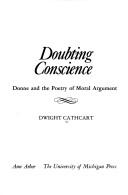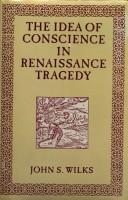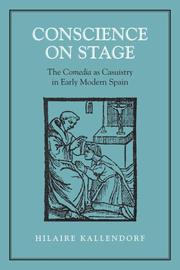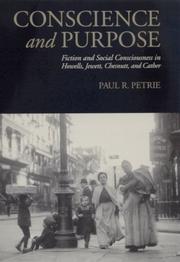Book
ISBN: 1487512694 9781487512699 9781487501204 148750120X 9781487512705 1487512708 Year: 2018 Publisher: Toronto : University of Toronto Press,
Abstract | Keywords | Export | Availability | Bookmark
 Loading...
Loading...Choose an application
- Reference Manager
- EndNote
- RefWorks (Direct export to RefWorks)
Examining works by well-known figures of the English Revolution, including John Milton, Oliver Cromwell, Margaret Fell Fox, Lucy Hutchinson, Thomas Hobbes, and King Charles I, Giuseppina Iacono Lobo presents the first comprehensive study of conscience during this crucial and turbulent period.
English literature --- Conscience in literature. --- History and criticism. --- Psychological study of literature --- anno 1500-1599 --- anno 1600-1699 --- Great Britain --- History --- Literature and the revolution.

ISBN: 9780472081981 0472081985 Year: 1975 Publisher: Ann Arbor (Mich.): University of Michigan press,
Abstract | Keywords | Export | Availability | Bookmark
 Loading...
Loading...Choose an application
- Reference Manager
- EndNote
- RefWorks (Direct export to RefWorks)
Book
Year: 1971 Volume: Bd. 5 Publisher: Bern : Frankfurt/M., Herbert Lang,
Abstract | Keywords | Export | Availability | Bookmark
 Loading...
Loading...Choose an application
- Reference Manager
- EndNote
- RefWorks (Direct export to RefWorks)
Book
ISBN: 9782707321572 9782707320735 2707320730 2707321575 Year: 2009 Volume: *14 2 Publisher: Paris: Éd. de Minuit,
Abstract | Keywords | Export | Availability | Bookmark
 Loading...
Loading...Choose an application
- Reference Manager
- EndNote
- RefWorks (Direct export to RefWorks)
Nous ne pouvons connaître les autres hommes que par leurs gestes, leurs paroles et leurs actes. Depuis deux siècles, le roman ne s'en est plus satisfait, et s'est voué, avec une intensité toujours croissante, à nous montrer la conscience au grand jour. Ce qu'elle a de plus secret, et parfois pour elle-même, vient sous nos yeux dans le moindre récit. Et ce que la Bible réservait à Dieu, sonder les reins et les cours, est devenu l'attribut commun des romanciers. Quel est le sens de cette transformation radicale Comment a-t-elle ce lien ? Quels chemins a-t-elle suivis, et quelles formes a-t elle produites ? De quelle compréhension de la conscience est-elle lourde ? Ce volume se concentre sur le monologue intérieur, en se tenant au plus près de ses usages variés, conversations intimes des héros de Stendhal, fulgurations décisives de Balzac, " tempêtes sous un crâne" de Victor Hugo. L'exploration se poursuit avec Virginia Woolf (Les Vagues), William Faulkner (Lumière d'août), et Samuel Beckett (L'Innommable).
Conscience in literature. --- Conscience (Morale) dans la littérature --- Conscience in literature --- Conscience (Morale) dans la littérature --- Philosophical anthropology --- Fiction --- History and criticism --- History and criticism. --- Roman --- Histoire et critique --- Fiction - 19th century - History and criticism --- Fiction - 20th century̨ - History and criticism

ISBN: 0415044545 Year: 1990 Publisher: London New York Routledge
Abstract | Keywords | Export | Availability | Bookmark
 Loading...
Loading...Choose an application
- Reference Manager
- EndNote
- RefWorks (Direct export to RefWorks)
English literature --- Thematology --- Drama --- anno 1600-1699 --- anno 1500-1599 --- Conscience dans la litterature --- Conscience in literature --- Geweten in de literatuur --- English drama (Tragedy) --- History and criticism --- English drama --- Early modern and Elizabethan, 1500-1600 --- 17th century

ISBN: 1442684216 9781442684218 9780802092298 0802092292 Year: 2007 Publisher: Toronto, [Ontario] ; Buffalo, [New York] ; London, [England] : University of Toronto Press,
Abstract | Keywords | Export | Availability | Bookmark
 Loading...
Loading...Choose an application
- Reference Manager
- EndNote
- RefWorks (Direct export to RefWorks)
It is no accident that some variation of the question 'What should I do?' appears in over three-quarters of the comedic plays of the Spanish Golden Age. Casuistical dialogue was a concern, even an obsession, of Spanish playwrights during the seventeenth century, many of whom were educated by Jesuit casuists. Conscience on Stage is a study of casuistry or case morality as the foundation for a poetics of seventeenth-century Spanish comedias.Hilaire Kallendorf examines the Jesuit upbringing and casuistical education of major playwrights of the Spanish Golden Age, many of whom were also priests, and introduces the vocabulary of casuistry, as expressed in both confessors' manuals and in stage plays. Engaging issues of class, gender, and age to explore scenes of advice-giving and receiving, she demonstrates how the culture-specific construct of 'conscience' in early modern Spain can be recovered by means of a Foucauldian genealogy, which enlists the skills of philology at the service of a larger vision of the history of ideas. This study outlines and reiterates the relationship of theatre to casuistry, the Jesuit contributions to Spanish literary theory and practice, and the importance of casuistry for the study of early modern subjectivity.
Spanish drama (Comedy) --- Spanish drama --- Christianity in literature. --- Casuistry in literature. --- Casuistry. --- Conscience in literature. --- Confession in literature. --- Confession (Liturgy) --- Penitential celebrations --- Penitential rites --- Cases of conscience --- Christian ethics --- Ethics --- Scholasticism --- Applied ethics --- History and criticism. --- Catholic Church --- History
Book
ISBN: 9782080285652 2080285653 Year: 2023 Publisher: Paris: Flammarion,
Abstract | Keywords | Export | Availability | Bookmark
 Loading...
Loading...Choose an application
- Reference Manager
- EndNote
- RefWorks (Direct export to RefWorks)
A-t-on le droit de sacrifier une vie pour en sauver plusieurs ? Comment rendre justice quand il y a mort d’homme, mais ni responsables, ni coupables assignables ? Vaut-il mieux mourir pour ses idées que se compromettre ? Des questions de justice sociale aux nouveaux enjeux de la bioéthique ou du droit international, le débat moral s’invite sur tous les terrains. Mais la théorie de la justice ne peut pas tout : un scrupule, un souvenir, un doute peuvent survenir qui brouillent la réflexion. Parce qu’elle prend en charge la part des émotions et de l’imagination, la littérature offre ses propres ressources pour nous aider à répondre à la question récurrente : qu’est-il juste de faire ? Convoquant aussi bien des œuvres classiques que des références populaires, de Victor Hugo au soldat Ryan de Spielberg en passant par Kafka, Melville ou Camus, cet essai nous plonge dans les grands dilemmes pour mettre au jour, sans jugement tranché ni solution de facilité, les ressorts de nos luttes intérieures. La littérature est le laboratoire des cas de conscience.
Littérature et morale. --- Casuistique. --- Choix moral. --- Conscience morale. --- Casuistry in literature --- Littérature et morale --- Casuistique --- Choix moral --- Conscience morale --- Casuistry in literature. --- Conscience in literature. --- Decision making --- Moral and ethical aspects.

ISBN: 0817314849 9780817314842 Year: 2005 Publisher: Tuscaloosa University of Alabama press
Abstract | Keywords | Export | Availability | Bookmark
 Loading...
Loading...Choose an application
- Reference Manager
- EndNote
- RefWorks (Direct export to RefWorks)
American fiction --- Conscience in literature --- Ethics in literature --- Literature and society --- Social ethics in literature --- History and criticism --- Cather, Willa, --- Chesnutt, Charles W. --- Howells, William Dean, --- Jewett, Sarah Orne, --- Ethics.
Book
ISBN: 9780817394486 Year: 2023 Publisher: Tuscaloosa, Alabama : University of Alabama Press,
Abstract | Keywords | Export | Availability | Bookmark
 Loading...
Loading...Choose an application
- Reference Manager
- EndNote
- RefWorks (Direct export to RefWorks)
"'Bold Conscience' chronicles the shifting conception of conscience in early modern England, as it evolved from a faculty of restraint--what the author labels "cowardly conscience"--to one of bold and forthright self-assertion. Caught at the vortex of public and private concerns, the concept of the conscience played an important role in post-Reformation England, from clerical leaders on down to laymen, not least because of its central place in determining loyalties during the English Civil War and the consequent regicide of King Charles I. Yet within this mix of perspectives, the most sinuous, complex, and ultimately lasting perspectives on bold conscience emerge from deliberately literary, rhetorically artistic voices--Shakespeare, Donne, and Milton. Joshua Held argues that literary texts by these authors, in re-casting the idea of conscience as a private, interior, shameful state to one of boldness fit for the public realm, parallel a historical development in which the conscience becomes a platform both for royal power and for common dissent in post-Reformation England. With the 1649 regicide of King Charles I as a fulcrum that unites both literary and historical timelines, Held tracks the increasing power of the conscience from William Shakespeare's Hamlet and Henry VIII to John Donne's court sermons, and finally to Milton's Areopagitica and Charles's defense of his kingship, Eikon Basilike. In a direct attack on Eikon Basilike, Milton destroys the prerogative of the royal conscience in Eikonoklastes, and later in Paradise Lost proposes an alternative basis for inner confidence, rooting it not in divine right but in the 'paradise within,' a metonym for conscience. Applying a fine-grain literary analysis to literary England from about 1601 to 1667, this study looks backward as well to the theological foundations of the concept in Luther of the 1520s and forward to its transformation by Locke into the term 'consciousness' in 1689. Ultimately, Held's study shows how the idea of a conscience in early modern England, long central to the private self and linked to the will, memory, and mind-emerges as a nexus between the private self and the realm of public action, a bulwark against absolute sovereignty, and its attenuation as a means of more limited, personal certainty. Whether in Milton's struggle against King Charles or Hamlet's against King Claudius, the conscience born of the Reformation becomes less a state of inner critique and more a form of outward expression fit for the communal life and commitments demanded by the early modern era"--
English literature --- Conscience in literature. --- Christianity and politics --- Christianity and politics --- Conscience --- Politics and literature --- Politics and literature --- History and criticism. --- History --- History --- Religious aspects --- Christianity. --- History --- History --- Shakespeare, William, --- Donne, John, --- Milton, John, --- Criticism and interpretation. --- Criticism and interpretation. --- Criticism and interpretation.
Book
ISBN: 9782600012386 2600012389 Year: 2008 Volume: 447 Publisher: Paris: Droz,
Abstract | Keywords | Export | Availability | Bookmark
 Loading...
Loading...Choose an application
- Reference Manager
- EndNote
- RefWorks (Direct export to RefWorks)
French fiction --- Symbolism in literature. --- Conscience in literature. --- Symbolism (Literary movement) --- Roman français --- Symbolisme dans la littérature --- Conscience (Morale) dans la littérature --- Symbolisme (Mouvement littéraire) --- History and criticism. --- Histoire et critique --- Dujardin, Edouard, --- Gide, André, --- Gourmont, Remy de, --- Schwob, Marcel, --- Criticism and interpretation. --- de Gourmont, Remy --- 840-31 "18" --- Franse literatuur: roman--19e eeuw. Periode 1800-1899 --- 840-31 "18" Franse literatuur: roman--19e eeuw. Periode 1800-1899 --- Roman français --- Symbolisme dans la littérature --- Conscience (Morale) dans la littérature --- Symbolisme (Mouvement littéraire) --- Gide, André, --- Conscience in literature --- Symbolism in literature --- Signs and symbols in literature --- Symbolism in folk literature --- History and criticism --- Dujardin, Édouard, --- Dujardin, Edouard, - 1861-1949 --- Gide, André, - 1869-1951. --- Schwob, Marcel, - 1867-1905

 Search
Search Feedback
Feedback About UniCat
About UniCat  Help
Help News
News